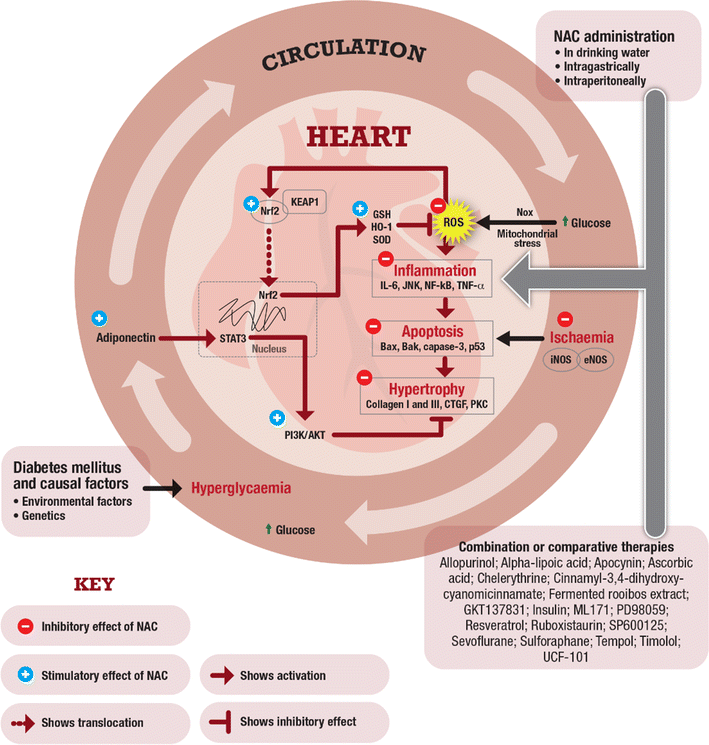N-acetylcysteine Diabetes

N-acetyl-cysteine and diabetes putting the pieces together.
Additionally, some proponents claim that n-acetylcysteine can help prevent cancer. so far, scientific support for the benefits of n-acetylcysteine is lacking. here's a look at some key research findings: n-acetylcysteine may help keep chronic bronchitis in check, according to a 2000 report in clinical therapeutics. looking at data from eight clinical trials, the report's authors found that long-term use of n-acetylcysteine may help prevent acute flare-ups of chronic bronchitis and, in turn, lower health care costs. n-acetylcysteine may aid in diabetes management, suggests a 2006 study from the journal of basic and n-acetylcysteine diabetes clinical physiology and pharmacology. involving 32 patients with type 2 diabetes and 15 healthy controls, the study found that three months of treatment with n-acetylcysteine helped regulate glutathione levels in diabetes patients. the study's authors suggest that regulating glutathione levels may help protect against diabetic complications brought on by free radical-induced damage. Only recently, however, have researchers examined the possible role on free radicals in the pathogenesis of diabetes. in the present study, glutathione (gsh) and major antioxidant enzyme levels in plasma of patients with type ii diabetes mellitus were assessed both before and after 3 months of n-acetylcysteine (nac) therapy. N-acetyl-cysteine (nac) is an amino acid used by the liver and the lymphocytes to detoxify chemicals and other poisons. it is a powerful detoxifier of alcohol, tobacco smoke, and environmental pollutants all of which are immune suppressors. See full list on verywellhealth. com.
Nacetylcysteine Benefits Side Effects Dosage Interactions
N-acetylcysteine may trigger a number of side effects, including nausea, diarrhea, and vomiting. what's more, n-acetylcysteine can increase your levels of homocysteine (an amino acid linked to heart disease). if you're taking n-acetylcysteine, it's important to get your homocysteine levels checked on a regular basis. Some adverse events have been reported in animal studies n-acetylcysteine diabetes (typically at higher doses), such as pulmonary hypertension and seizures.
The aim of this study was to determine whether n-acetylcysteine (nac), an anti-inflammatory antioxidant, attenuates programmed susceptibility to obesity and insulin resistance in offspring of mothers on a high-fat diet (hfd) during pregnancy. cd1 female mice were acutely fed a standard breeding chow or hfd. The present study is a long-term comparative trial of n -acetyl-cysteine (nac), oxerutin (oxe), and taurine (tau) in experimental diabetes. not only does nac exhibit antioxidant properties (10), but it may also counteract the glycation cascade through the inhibition n-acetylcysteine diabetes of oxidation. Type 1 diabetes mellitus (t1dm) is characterized by insulin-deficient production leading to hyperglycemia, which is associated with diabetic complications such as cardiovascular diseases. antioxidants have been proving a good alternative to diabetic complications, with n-acetylcysteine (nac) having antioxidant characteristics. A cysteine derivative, n-acetyl-cysteine (nac), is known to be anti-oxidant, but its role in the protection of pancreatic beta cells in type 1 diabetes remains unclear. the aim of this study is to clarify the effect of nac on pancreatic beta cells using an adoptive transfer system in a murine model of type 1 diabetes.
In patients n-acetylcysteine diabetes with stable, moderate-to-severe chronic obstructive pulmonary disease (copd), n-acetylcysteine may help improve physical performance. for a 2009 study published in the journal chest, 24 copd patients took either n-acetylcysteine or a placebo daily for six weeks. after taking a two-break (in order to eliminate n-acetylcysteine from the bodies of participants in the treatment group), the study participants were switched over to the alternate therapy for an additional six weeks. study results indicated that n-acetylcysteine helped improve several markers of respiratory health, such as lung capacity and exercise endurance. N-acetylcysteine may help treat polycystic ovary syndrome (pcos), according to a 2007 study in the journal acta obstetricia et gynecologica scandinavica. for one menstrual cycle, 573 pcos patients were treated with clomiphene citrate (a drug commonly used to induce ovulation). next, 470 of these patients took a combination of n-acetylcysteine and clomiphene citrate for another menstrual cycle. study results revealed that ovulation rates improved significantly after the addition of n-acetylcysteine. n-acetylcysteine may have a slightly beneficial effect on lung function among people with cystic fibrosis, according to a 1999 report in acta paediatrica. sizing up data from 23 studies, the report's authors concluded that there is not enough evidence to support the use of n-acetylcysteine in the treatment of cystic fibrosis. however, the report's authors noted that long-term use of n-acetylcysteine may lead to some improvement in lung function for cystic fibrosis patients.
Effect Of Nacetylcysteine On Dyslipidemia And Carbohydrate
N-acetylcysteine may aid in n-acetylcysteine diabetes the prevention management of diabetes, suggests a 2016 study in the american journal of translational research. the research involved mice that were either fed a high-fat diet (replicating the effects of type 2 diabetes) or had medical-induced diabetes (closely mirroring type 1 diabetes). More n-acetylcysteine diabetes images.
In addition, n-acetylcysteine may interact with several drugs (including certain blood pressure medications, medicines that suppress the immune system, cancer drugs, and medications that treat chest pain). Supplements haven't been tested for safety and due to the fact that dietary supplements are largely unregulated, the content of some products may differ from what is specified on the product label. also keep in mind that the safety of supplements in pregnant women, nursing mothers, children, and those with medical conditions or who are taking medications has not been established. Acetylcysteine in diabetes (aid): a randomized study of acetylcysteine for the prevention of contrast nephropathy in diabetics. coyle lc (1), rodriguez a, jeschke re, simon-lee a, abbott kc, taylor aj.

Komentar
Posting Komentar